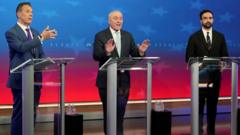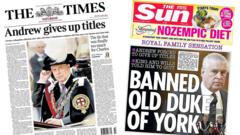What Are the Top Five Takeaways from the Mamdani-Cuomo NYC Mayoral Debate?

Published: 2025-10-17 03:00:24 | Category: wales
This article provides a comprehensive overview of the recent New York City mayoral debate, highlighting the key points presented by the leading candidates—Zohran Mamdani, Andrew Cuomo, and Curtis Sliwa. As they vie for control of the nation's largest city, the discussion touched on pressing issues like affordability, public safety, and the looming influence of former President Donald Trump.
Last updated: 04 October 2023 (BST)
Key Takeaways from the Mayoral Debate
- Zohran Mamdani has gained a significant lead in recent polls.
- Andrew Cuomo faced scrutiny over his past controversies, including allegations of sexual harassment.
- Public safety and affordability emerged as central themes during the debate.
- Donald Trump’s influence and policies were a recurring topic throughout the evening.
- Curtis Sliwa positioned himself as a strong advocate for crime prevention and public safety.
The Candidates and Their Positions
As the debate unfolded at Rockefeller Center, each candidate presented their vision for New York City, with Mamdani, Cuomo, and Sliwa representing a spectrum of political ideologies. Polls suggest that Mamdani has solidified his position as the frontrunner with 46%, compared to Cuomo's 33%. The outcome of this race is poised to have implications far beyond the city limits, especially as it pertains to national Democratic strategies following their recent setbacks.
Mamdani's Progressive Vision
Zohran Mamdani, the progressive candidate and current state assemblyman, has made headlines for his strong stance on various social issues, particularly regarding Palestine and Israel. Throughout the debate, he reiterated his support for Palestinian statehood and condemned Israel's military actions in Gaza. His opponents seized on these views, suggesting they could alienate significant voter blocs, particularly within the Jewish community in New York.
Mamdani faced criticism for his reluctance to condemn the phrase "globalise the intifada." Despite this, he asserted his commitment to serve all New Yorkers, emphasising his belief in inclusivity. His strategy appears to resonate with a segment of the electorate seeking substantial change, especially in the wake of the Democrats' recent electoral challenges.
Cuomo's Experience Under Fire
Andrew Cuomo, the former governor of New York, framed himself as the candidate with the experience necessary to navigate the complexities of governing a major city. However, his past is marred by controversies, including his resignation following allegations of sexual harassment and criticisms of his handling of nursing home deaths during the COVID-19 pandemic. During the debate, he defended his record, stating that "everyone did whatever they could in this state" during the pandemic. He also labelled accusations regarding nursing homes as "totally false."
Cuomo's attempts to pivot the conversation towards his experience were met with strong rebuttals from Mamdani, who accused him of lacking integrity. This back-and-forth highlighted the tension between the candidates and underscored the importance of accountability in political leadership.
Sliwa's Public Safety Focus
As the sole Republican in the race, Curtis Sliwa presented himself as a candidate deeply concerned about public safety. He drew on his background as the founder of the Guardian Angels, a group known for its community policing efforts. Sliwa's confidence shone through as he frequently interjected during the debate, aiming to capture the attention of voters prioritising safety in an increasingly crime-conscious environment.
Sliwa's proposals, including freeing up vacant apartments within New York City's public housing system, resonated with concerns about affordability, which is a pressing issue for many New Yorkers. He effectively positioned his campaign as one that not only addresses safety but also the economic realities facing residents.
The Impact of Donald Trump
While the debate primarily revolved around local issues, the influence of Donald Trump loomed large. Mamdani made it clear that he would oppose Trump’s policies, particularly the former president’s stance on immigration and federal funding. Cuomo, meanwhile, attempted to present himself as the only candidate capable of effectively managing the relationship with Trump, arguing that his experience in office makes him uniquely qualified to handle potential federal pressures.
For many voters, the mayor's relationship with the White House could significantly impact New York City's future, especially concerning federal funding and immigration policies. This dynamic adds another layer of complexity to an already multifaceted electoral landscape.
Affordability: The Core Issue
Affordability emerged as the crux of the candidates’ platforms during the debate. With soaring rent and living costs, candidates were pressed to disclose their personal financial situations, including rent and grocery expenses. This line of questioning aimed to connect the candidates with the everyday struggles of New Yorkers. Mamdani’s proposal to make public transportation free was one of several ideas put forth to alleviate financial pressures.
Cuomo proposed stricter income limits for those living in rent-stabilised apartments, a move he argued would ensure fairness in housing. However, Mamdani countered this by highlighting the need for broader systemic change rather than temporary fixes. The discussion about rent freezes and housing availability revealed the stark differences between the candidates' approaches to solving one of the city’s most pressing issues.
Conclusion: What Lies Ahead?
The debate showcased the divergent paths each candidate envisions for New York City. With early voting approaching, the stakes are high. Voters will need to consider not just the candidates' platforms, but also their backgrounds and capabilities to lead effectively in a time of uncertainty. As the election date draws near, the pressure mounts for candidates to clarify their visions and engage with the electorate on the most pressing issues facing New Yorkers today.
As New York City stands at a crossroads, the outcome of this mayoral race will likely reverberate beyond the city, influencing national politics and shaping the future of the Democratic Party. Will voters opt for a progressive approach under Mamdani, return to the establishment with Cuomo, or embrace Sliwa’s public safety-centric platform? The answer may define the city for years to come. #NewYorkPolitics #MayoralDebate #Election2023
FAQs
Who are the leading candidates in the New York City mayoral race?
The leading candidates are Zohran Mamdani, Andrew Cuomo, and Curtis Sliwa, each representing different political ideologies and platforms.
What key issues were discussed during the mayoral debate?
Key issues included public safety, affordability, housing, and the influence of Donald Trump on New York City politics.
How is Zohran Mamdani positioning himself in the race?
Mamdani is presenting himself as a progressive candidate focused on inclusivity, social justice, and affordability, appealing to younger voters and those seeking change.
What controversies surround Andrew Cuomo?
Cuomo faces allegations of sexual harassment and criticism regarding his handling of nursing home deaths during the COVID-19 pandemic, which have cast a shadow over his campaign.
What role does Donald Trump play in the mayoral race?
Trump's influence is a significant topic, with candidates discussing how they would engage with his policies, particularly on immigration and federal funding.



